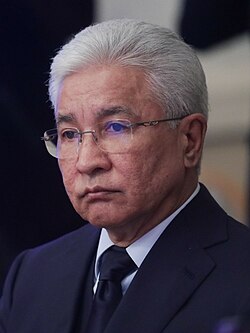This article needs to be updated.(January 2026) |
| Secretary General of the Collective Security Treaty Organization | |
|---|---|
| Генеральный секретарь ОДКБ | |
 Logo of the CSTO | |
 Flag of the CSTO | |
since 1 January 2026 | |
| CSTO | |
| Member of | CSTO Collective Security Council |
| Seat | CSTO Secretariat, Moscow, Russia |
| Term length | Four years, renewable |
| Formation | October 1996 |
| First holder | Vladimir Zemsky |
The secretary general of CSTO is the chief civil servant of the Collective Security Treaty Organization (CSTO), responsible for coordinating the workings of the alliance. The officeholder is one of the foremost political official in the organization. The current secretary general is Kyrgyz politician Taalatbek Masadykov, who took office on 1 January 2026.



